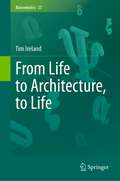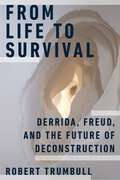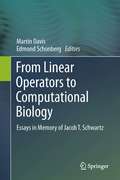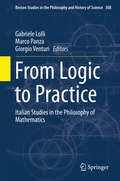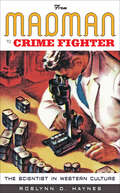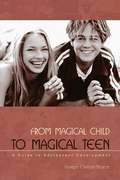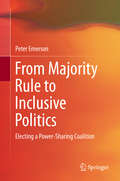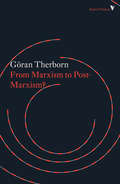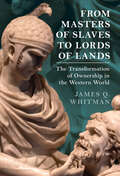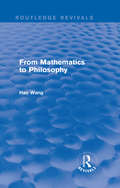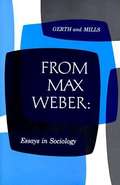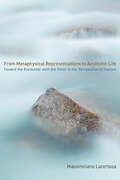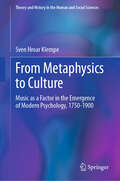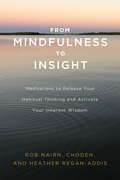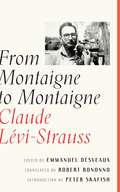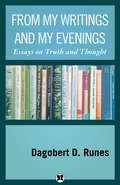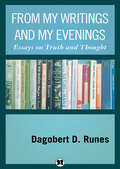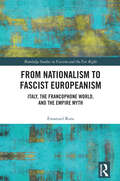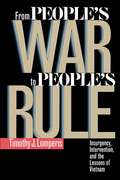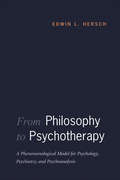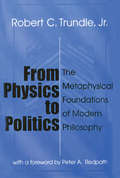- Table View
- List View
From Life to Architecture, to Life (Biosemiotics #27)
by Tim IrelandThe book establishes a correlation between architectural theory and the biosemiotic project, and suggest how this coupling establishes a framework leading to an architectural-biosemiotic paradigm that puts biosemiotic theory at the heart of cognising the built environment, and offers an approach to understanding and shaping the built environment that supports (and benefits) human, and organismic, spatial intelligence.
From Life to Survival: Derrida, Freud, and the Future of Deconstruction
by Robert TrumbullContemporary continental thought is marked by a move away from the “linguistic turn” in twentieth-century European philosophy, as new materialisms and ontologies seek to leave behind the thinking of language central to poststructuralism as it has been traditionally understood. At the same time, biopolitical philosophy has brought critical attention to the question of life, examining new formations of life and death. Within this broader turn, Derridean deconstruction, with its apparent focus on language, writing, and textuality, is generally set aside.This book, by contrast, shows the continued relevance of deconstruction for contemporary thought’s engagement with resolutely material issues and with matters of life and the living. Trumbull elaborates Derrida’s thinking of life across his work, specifically his recasting of life as “life death,” and in turn, survival or living on. Derrida’s activation of Freud, Trumbull shows, is central to this problematic and its consequences, especially deconstruction’s ethical and political possibilities. The book traces how Derrida’s early treatment of Freud and his mobilization of Freud’s death drive allow us to grasp the deconstructive thought of life as constitutively exposed to death, the logic subsequently rearticulated in the notion of survival. Derrida’s recasting of life as survival, Trumbull demonstrates, allows deconstruction to destabilize inherited understandings of life, death, and the political, including the dominant configurations of sovereignty and the death penalty.
From Linear Operators to Computational Biology
by Martin Davis Edmond SchonbergIn his rich and varied career as a mathematician, computer scientist, and educator, Jacob T. Schwartz wrote seminal works in analysis, mathematical economics, programming languages, algorithmics, and computational geometry. In this volume of essays, his friends, students, and collaborators at the Courant Institute of Mathematical Sciences present recent results in some of the fields that Schwartz explored: quantum theory, the theory and practice of programming, program correctness and decision procedures, dextrous manipulation in Robotics, motion planning, and genomics. In addition to presenting recent results in these fields, these essays illuminate the astonishingly productive trajectory of a brilliant and original scientist and thinker.
From Logic to Practice
by Marco Panza Gabriele Lolli Giorgio VenturiThis book brings together young researchers from a variety of fields within mathematics, philosophy and logic. It discusses questions that arise in their work, as well as themes and reactions that appear to be similar in different contexts. The book shows that a fairly intensive activity in the philosophy of mathematics is underway, due on the one hand to the disillusionment with respect to traditional answers, on the other to exciting new features of present day mathematics. The book explains how the problem of applicability once again plays a central role in the development of mathematics. It examines how new languages different from the logical ones (mostly figural), are recognized as valid and experimented with and how unifying concepts (structure, category, set) are in competition for those who look at this form of unification. It further shows that traditional philosophies, such as constructivism, while still lively, are no longer only philosophies, but guidelines for research. Finally, the book demonstrates that the search for and validation of new axioms is analyzed with a blend of mathematical historical, philosophical, psychological considerations.
From Logos to Person: History, Traditions, and Perspectives (Comparative Philosophy of Religion #5)
by Christophe Rico Joaquin PanielloThis contributed volume considers the notions of person and logos from different approaches. Although many treat them separately, this text focuses on their intricated interplay. Drawing upon diverse cultural traditions, including Hebrew, Greek, Latin, and Arab sources, this book engages philologists, philosophers, and theologians through captivating analysis that spans from ancient philosophical perspectives to contemporary scholarship. The genesis of this scholarly endeavor owes to a conference held at the Polis Institute in Jerusalem in October 2021, in collaboration with Johns Hopkins University, Notre Dame University, and the University of Hamburg. Out of fifty-seven presentations, fourteen were selected to compose this thought-provoking volume, ensuring a well-structured exposition on the subject. The opening historical overview provides the framework of the volume, and culminates with Beuchot's intriguing proposition of man as an ‘analogical animal’. Subsequent sections explore the concept of logos, tracing its usage in Plato and the Gospel of Saint John, as well as its evolution through scholasticism, modernism, and contemporary thought. Contained are highlights on the notion of person, its development in various languages, and delves into the intricate connections between rationality, speech, and personhood. Metaphysical and personalist approaches are also presented; this book appeals to researchers and scholars in the field.
From Madman to Crime Fighter: The Scientist in Western Culture
by Roslynn D. HaynesA study of the scientist in Western culture, from medieval images of alchemists to present-day depictions of cyberpunks and genetic engineers.They were mad, of course. Or evil. Or godless, amoral, arrogant, impersonal, and inhuman. At best, they were well intentioned but blind to the dangers of forces they barely controlled. They were Faust, Frankenstein, Jekyll, Moreau, Caligari, Strangelove—the scientists of film and fiction, cultural archetypes that reflected ancient fears of tampering with the unknown or unleashing the little-understood powers of nature.In From Madman to Crime Fighter, Roslynn D. Haynes analyzes stereotypical characters—including the mad scientist, the cold-blooded pursuer of knowledge, the intrepid pathbreaker, and the bumbling fool—that, from medieval times to the present day, have been used to depict the scientist in Western literature and film. She also describes more realistically drawn scientists, characters who are conscious of their public responsibility to expose dangers from pollution and climate change yet fearful of being accused of lacking evidence.Drawing on examples from Britain, America, Germany, France, Russia, and elsewhere, Haynes explores the persistent folklore of mad doctors of science and its relation to popular fears of a depersonalized, male-dominated, and socially irresponsible pursuit of knowledge for its own sake. She concludes that today’s public response to science and scientists—much of it negative—is best understood by recognizing the importance of such cultural archetypes and their significance as myth. From Madman to Crime Fighter is the most comprehensive study of the image of the scientist in Western literature and film.
From Magical Child to Magical Teen: A Guide to Adolescent Development
by Joseph Chilton PearceA groundbreaking perspective on Nature's plan for full human creativity and intelligence during the teen years• Shows what is at the core of today's serious social and psychological problems• Explores the sexual and spiritual stage of adolescent development• Details the connection between adolescent brain and heart development and the issue of nature vs. nurture• By the author of Magical Child (250,000 copies sold)Something is supposed to happen during the adolescent years--something greater than MTV, video games, and the Internet. Joseph Chilton Pearce describes this something as the natural mandate for post-biological development--the development of the sexual and spiritual senses and expansion of our growth process outside of our bodies and into the physical world that surrounds us.Though first written in the mid 1980s, the message of From Magical Child to Magical Teen is even more compelling and helpful today--especially for those who live with and work with adolescents. Drawing on the stages of development outlined by Swiss biologist Jean Piaget and the brain research of neuroscientist Paul MacLean, Pearce demonstrates how nature has built into us an agenda for the intelligent unfolding of our lives. He offers a powerful critique of contemporary child-rearing practices and a groundbreaking alternative to existing perspectives on adolescence so we can unleash our greatest potential, as well as that of our children, in order to experience our fullness in the manner nature intended all along.
From Majority Rule to Inclusive Politics
by Peter EmersonThis book discusses voting procedures in collective decision-making. Drawing on well-established election processes from all over the world, the author presents a voting procedure that allows for the speedy but fair election of a proportional, all-party coalition. The methodology - a matrix vote - is accurate, robust and ethno-color blind. In the vote, the counting procedure encourages all concerned to cross the gender as well as any party and/or sectarian divides. While in the resulting executive each party will be represented fairly and, at best, with the consensus of parliament, every minister will be the one most suited to his/her new portfolio. By using preferential voting and thus achieving consensus, the matrix vote will be fundamental to the resolution of conflicts. The matrix vote can also be used when: * two or more parliamentary parties elect a coalition government * one parliamentary party elects a government or shadow cabinet, or organizations in civil society elect their governing boards or executive committees * any group chooses a fixed number of individuals to form a team in which each member carries out a different function
From Marxism to Post-Marxism? (Radical Thinkers)
by Goran TherbornA comprehensive history of the development of Marxist theory and the parameters of 21st-century politicsIn this pithy and panoramic work—both stimulating for the specialist and the accessible to the general reader—one of the world's leading social theorists, Göran Therborn, traces the trajectory of Marxism in the twentieth century and anticipates its legacy for radical thought in the twenty-first.
From Masters of Slaves to Lords of Lands: The Transformation of Ownership in the Western World (Studies in Legal History)
by James Q. WhitmanToday we think of land as the paradigmatic example of property, while in the past, the paradigmatic example was often a slave. In this seminal work, James Q. Whitman asserts that there is no natural form of ownership. Whitman dives deep into the long Western history of this transformation in the legal imagination – the transformation from the ownership of humans and other living creatures to the ownership of land. This change extended over many centuries, coming to fruition only on the threshold of the modern era. It brought with it profound changes, not only in the way we understand ownership but also in the way we understand the state. Its most dramatic consequence arrived in the nineteenth century, with the final disappearance of the lawful private ownership of humans, which had been taken for granted for thousands of years.
From Mathematics to Philosophy (Routledge Revivals)
by Hao WangFirst published in 1974. Despite the tendency of contemporary analytic philosophy to put logic and mathematics at a central position, the author argues it failed to appreciate or account for their rich content. Through discussions of such mathematical concepts as number, the continuum, set, proof and mechanical procedure, the author provides an introduction to the philosophy of mathematics and an internal criticism of the then current academic philosophy. The material presented is also an illustration of a new, more general method of approach called substantial factualism which the author asserts allows for the development of a more comprehensive philosophical position by not trivialising or distorting substantial facts of human knowledge.
From Max Weber: Essays in Sociology
by Max Weber C. Wright Mills Hans H. GerthAn introduction to the work of the greatest German sociologist and a key figure in the development of present-day sociological thought.
From Metaphysical Representations to Aesthetic Life: Toward the Encounter with the Other in the Perspective of Daoism (SUNY series in Chinese Philosophy and Culture)
by Massimiliano LacertosaWhat is "Chinese philosophy?" What is "philosophy" itself? How can one understand unfamiliar philosophical stances? How can comparison become a prominent philosophical tool? In this book, Massimiliano Lacertosa examines these questions by proposing an ethical understanding of the aesthetic encounter with the other and the world. Through the analysis of the works of Laozi, Zhuangzi, Nietzsche, and Heidegger, among others, this book explores the possibilities of stepping out of the anthropocentric standpoint and seeing the relation of objects in the world under a different light. This implies a shift from the metaphysical representation of the world divided between the sensible and the supersensible to an aesthetic and undivided experience of the world in which one partakes in the constant transformation of the myriad things. Approachable yet rigorous, this book is essential reading for anyone interested in the most fundamental issues of philosophy and in the challenges of doing philosophy in a multicultural context.
From Metaphysics to Culture: Music as a Factor in the Emergence of Modern Psychology, 1750-1900 (Theory and History in the Human and Social Sciences)
by Sven Hroar KlempeThis book is a follow-up to the book Tracing the Emergence of Psychology, 1520-1750: A Sophisticated Intruder to Philosophy (Springer 2020). In contrast, this new book covers the period 1750-1900. Whereas the previous book focused on how psychology intervened in philosophy and theology, the perspective now is how philosophy and psychology tried to free themselves from each other. Kant&’s critical project formed an important start on this. Nevertheless, this was a struggle during the whole period, with a culmination at the end of the 19th century. When experimental psychology was established in Leipzig, psychology became regarded as an independent science. Another aspect of this new project is to pursue how experimental psychology ended up with music and culture as important factors. These are highly related to the role of sensation in psychology, which influenced how Baumgarten turned the psychological project into aesthetics in 1750. Thus, psychology in dialogue with music and aesthetics forms the red thread in this book. This book targets all interested in the history of psychology.
From Mindfulness to Insight: Meditations to Release Your Habitual Thinking and Activate Your Inherent Wisdom
by Choden Rob Nairn Heather Regan-AddisBuilding on mindfulness and self-compassion practices, this step-by-step guide to secular insight meditation shows the way to freedom from deeply rooted thought patterns.Discover joy within yourself and heartfelt connection with others by releasing the habitual thought patterns that cause suffering and alienation. Drawing on Buddhist wisdom as well as the latest research in psychology and neuroscience, this book provides you with the tools needed to recognize the habits of thinking that fuel anger, desire, jealousy, and pride. Building on mindfulness and self-compassion practice, it offers a step-by-step series of guided meditations that create the conditions for liberating insight and wisdom to naturally arise. Thousands of people in the last decade have benefited from practicing the exercises in this book, which were developed and taught as part of the curriculum at the Mindfulness Association, an organization founded to deliver training in mindfulness, compassion, and insight.
From Models to Simulations (History and Philosophy of Technoscience)
by Franck VarenneThis book analyses the impact computerization has had on contemporary science and explains the origins, technical nature and epistemological consequences of the current decisive interplay between technology and science: an intertwining of formalism, computation, data acquisition, data and visualization and how these factors have led to the spread of simulation models since the 1950s. Using historical, comparative and interpretative case studies from a range of disciplines, with a particular emphasis on the case of plant studies, the author shows how and why computers, data treatment devices and programming languages have occasioned a gradual but irresistible and massive shift from mathematical models to computer simulations.
From Montaigne to Montaigne
by Claude Lévi-StraussTwo previously unpublished lectures charting the renowned anthropologist&’s intellectual engagement with the sixteenth-century French essayist Michel de Montaigne In January 1937, between the two ethnographic trips he would describe in Tristes Tropiques, Claude Lévi-Strauss gave a talk to the Confédération générale du travail in Paris. Only recently discovered in the archives of the Bibliothèque national de France, this lecture, &“Ethnography: The Revolutionary Science,&” discussed the French essayist Michel de Montaigne, to whom Lévi-Strauss would return in remarks delivered more than a half-century later, in the spring of 1992. Bracketing the career of one of the most celebrated anthropologists of the twentieth century, these two talks reveal how Lévi-Strauss&’s ethnography begins and ends with Montaigne—and how his reading of his intellectual forebear and his understanding of anthropology evolve along the way.Published here for the first time, these lectures offer new insight into the development of ethnography and the thinking of one of its most important practitioners. Essays by Emmanuel Désveaux, who edited the original French volume De Montaigne à Montaigne, and Peter Skafish expand the context of Lévi-Strauss&’s talks with contemporary perspectives and commentary.
From Morality To Mental Health: Virtue And Vice In A Therapeutic Culture (Practical And Professional Ethics Ser.)
by Mike W. MartinMorality and mental health are now inseparably linked in our view of character. Alcoholics are sick, yet they are punished for drunk driving. Drug addicts are criminals, but their punishment can be court ordered therapy. The line between character flaws and personality disorders has become fuzzy, with even the seven deadly sins seen as mental disorders. In addition to pathologizing wrong-doing, we also psychologize virtue; self-respect becomes self-esteem, integrity becomes psychological integration, and responsibility becomes maturity. Moral advice is now sought primarily from psychologists and therapists rather than philosophers or theologians.
From My Writings and My Evenings
by Dagobert D. RunesIt is late in the evening and a philosopher wants to get words on paper. No grand project. No grand system of thought, just an attempt to get some things off his chest. Where would he turn his attention? Where would his thoughts lead him? Several catch phrases become crystallization points for his thoughts: thinking, the nature of man, the art of living, God and religion, Jews and anti-Semitism, crime and punishment, education, arts and science, language and literature, history and the state. Dagobert D. Runes put in much effort to avoid the pursuit of false ideas. In fact, the preface to From My Writings and My Evenings reads: "Hesitancy in judgment is the true mark of the thinker. Men think quite alike as they desire alike; if they were different, they could not co-exist even for a day. But most people judge by traditional or imitated judgment patterns, and snap judgments are the rule and the rulers." How is one to avoid the pitfalls apparent in such judgments, and still contribute to one's personal philosophy? If you are hesitant in your judgments, then what can you state that you believe to be unquestionably true? The result is a touching document of a philosopher who investigates many areas of man's endeavors, and who seeks to characterize what he judges to be the pure, true nature of these realms.
From My Writings and My Evenings: Essays on Thoughts and Truth
by Dagobert D. RunesA scholar embarks on a journey into the philosophical issues that concern him most in this profound and deeply personal essay collection. It is late in the evening and a philosopher wants to get words on paper. No grand project or treatise, just an attempt to get some things off his chest. Certain phrases become touchstones for his thoughts: the nature of man, the art of living, God and religion, Jews and anti-Semitism, crime and punishment, arts and science, language and literature, history and the state, education, and thinking itself. Believing that hesitancy in judgment is the true mark of the thinker, Dagobert D. Runes interrogates each of these themes as he wrestles with the question: If you hesitate in your judgments, how can you arrive at certainty? The result is a touching document of a philosopher who investigates many areas of man&’s endeavors, and who seeks to characterize what he judges to be the pure, true nature of these realms.
From Nationalism to Fascist Europeanism: Italy, the Francophone World, and the Empire Myth (Routledge Studies in Fascism and the Far Right)
by Emanuel RotaThis book traces the intellectual history of fascist Europeanism, examining how Italian and Francophone fascist thinkers envisioned European unity as a means of consolidating power, overcoming nationalist divisions, and resisting external threats rather than promoting peace or democracy.Readers will discover how fascist thinkers—from Mussolini and Drieu La Rochelle to Evola, Thiriart, and Romualdi—reimagined European unity as a radical alternative to liberal democracy, driven by visions of power, hierarchy, and racial identity. By exploring pivotal debates on nationalism, modernity, and empire, this book reveals the hidden ideological struggles within fascist Europeanism and their enduring legacy in today’s far-right movements. Richly grounded in historical analysis and original sources, it provides a provocative new perspective on European integration as an ongoing political battleground.This book is intended for scholars, researchers, and students of modern European history, fascism, and political ideologies. It will also be of interest to those studying contemporary far-right movements and the historical roots of European integration.
From People’s War to People’s Rule
by Timothy J. LomperisTimothy Lomperis persuasively argues the ironic point that the lessons of American involvement in Vietnam are not to be found in any analysis of the war by itself. Rather, he proposes a comparison of the Vietnam experience with seven other cases of Western intervention in communist insurgencies during the Cold War era: China, Indochina, Greece, the Philippines, Malaya, Cambodia, and Laos. Lomperis maintains that popular insurgencies are manifestations of crises in political legitimacy, which occur as a result of the societal stresses caused by modernization. Therefore, he argues, any intervention in a 'people's war' will succeed or fail depending on how it affects this crisis. The unifying theme in the cases Lomperis discusses is the power of land reform and electoral democracy to cement political legitimacy and therefore deflect revolutionary movements. Applying this theory to the ongoing Sendero Luminoso insurgency in Peru, Lomperis makes a qualified prediction of that conflict's outcome. He concludes that a global trend toward democratization has produced a new era of 'people's rule.'
From Philosophy to Psychotherapy: A Phenomenological Model for Psychology, Psychiatry, and Psychoanalysis
by Edwin L. HerschPresenting a highly innovative exploration of the relationship between philosophical and psychological issues, Edwin L. Hersch argues that psychological theories and practices inescapably rest upon a series of philosophical positions – whether they are acknowledged and reflected upon or not. To examine this proposition Hersch develops his Hierarchy of Levels of Theoretical or Philosophical Inquiry Method, which involves the systematic consideration of a series of philosophical questions pertaining to the ontological, general epistemological, field-specific epistemological, and psychological stances adopted (either explicitly or implicitly) by any particular psychological theory. By using this hierarchical framework the book then attempts to develop a new approach to psychological theory and psychotherapeutic practice based largely on the premises of phenomenological philosophy. The scope of the book cuts across a variety of theoretical and professional disciplinary approaches within the broad psychological field in demonstrating the relevance of certain philosophical issues for all of them. Clinicians, theorists and students in the psychological field are presented with a palatable introduction to the importance and inevitability of dealing with philosophy in pursuing their own work. Furthermore, his philosophical explications of a variety of psychological theories provide a new tool with which to better understand, compare, or assess any internal inconsistencies.
From Physicians’ Professional Ethos towards Medical Ethics and Bioethics: A German Perspective on Historical Experiences and Lasting Commitments (Philosophy and Medicine #140)
by Corinna Delkeskamp-HayesThis book assembles essays by thinkers who were at the center of the German post World War II development of ethical thought in medicine. It records their strategies for overcoming initial resistance among physicians and philosophers and (in the East) politicians. This work traces their different approaches, such as socialist versus liberal bioethics; illustrates their attempt to introduce a culture of dialogue in medicine; and examines their moral ambiguities inherent to the institutionalization of bioethics and in law. Furthermore, the essays in this work pay special attention to the problem of ethics expertise in the context of a pluralism, which the intellectual mainstream of the country seeks to reduce to “varieties of post-traditionalism". Finally, this book addresses the problem of “patient autonomy”,and highlights the difficulty of harmonizing commitment to professional integrity with the project of enhancing physician’s responsiveness to suffering patients. As these essays illustrate, the development of bioethics in Germany does not follow a linear line of progressiveness, but rather retains a sense of the traditional ethos of the guild. An ethos, however, that is challenged by moral pluralism in such a way that, even today, still requires adequate solutions. A must read for all academics interested in the origins and the development of bioethics.
From Physics to Politics: The Metaphysical Foundations of Modern Philosophy
by Robert TrundleMass ideology is unique to modern society and rooted in early modern philosophy. Traditionally, knowledge had been viewed as resting on metaphysics. Rejecting metaphysical truth evoked questions about the source of -truth.- For nineteenth-century ideologists, -truth- comes either from dominating classes in a progressively determined history or from a post-Copernican freedom of the superior man to create it. In From Physics to Politics Robert C. Trundle, Jr. uncovers the relation of modern philosophy to political ideology. And in rooting truth in human nature and Nature by modal reasoning, he resolves the problem of politicized truth. Our concepts of scientific truth, logic, and necessity are essentially connected. Modern philosophy restricts our understanding of necessity to the political dreams and aspirations of Enlightenment intellectuals. As a result, these intellectuals refuse to acknowledge as factual or meaningful whatever is not intelligible within the practical goals of establishing science as a system of enlightened ideas. The effect of these ideas is that in our time metaphysical principles, speculative truths, our understanding of science, and the nature of logic have become subordinated to ideological dreams. Fascism, Nazism, Marxism, political correctness, and moral relativism are not historical aberrations but essential consequences. Trundle's work is groundbreaking and daring, and his underlying thesis demonstrates why scientific truth demands a modal defense. The defense not only integrates science, ethics, and politics, but shows how -truth- may be ascribed to moral and scientific principles in contrast to a modern philosophical tradition. Since this tradition is the origin of political ideology, it has led to an irrational politicization of truth. The book will appeal particularly to those interested in political history, histories of philosophy, the philosophy of sciences, and ethics.
